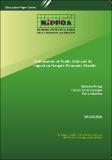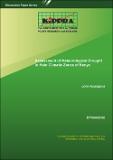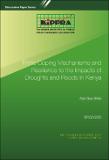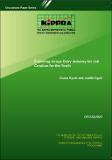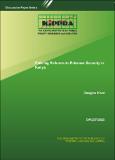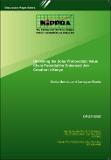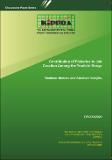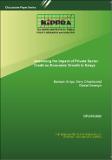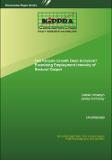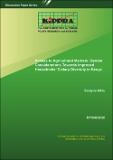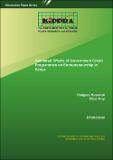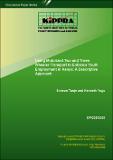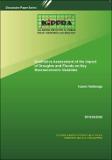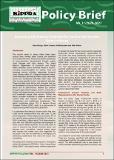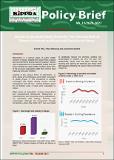3. KIPPRA Research Publications: Recent submissions
Now showing items 241-260 of 707
-
Discussion Paper No. 229 of 2020 on Assessing the Cotton, Textile and Apparel Sector Employment Potential in Kenya
(The Kenya Institute for Public Policy Research and Analysis (KIPPRA), 2020)Cotton-textile and apparel (CTA) sector is arguably one of the industries with the potential to absorb skilled, semi-skilled, and non-skilled workers within its chain of production. This paper explores the CTA sector value ... -
Discussion Paper No. 245 of 2020 on Optimization of Public Debt and its Impact on Kenya's Economic Growth
(The Kenya Institute for Public Policy Research and Analysis, 2020)Kenya’s Vision 2030 aims at achieving and maintaining a sustainable and inclusive annual growth of 10 per cent. To achieve this, the government embarked on expansionary fiscal policy, which involves investing in growth ... -
Discussion Paper No. 244 of 2020 on Assessment of Meteorological Drought in Main Climatic Zones of Kenya
(The Kenya Institute for Public Policy Research and Analysis, 2020)This paper presents a spatio-temporal assessment of meteorological drought in four counties of Kenya using Standardized Precipitation Index (SPI). Monthly rainfall data from the Climate Hazards group InfraRed Precipitation ... -
Discussion Paper No. 220 of 2020 on Firms Coping Mechanisms and Resilience to the Impacts of Droughts and Floods in Kenya
(The Kenya Institute for Public Policy Research and Analysis (KIPPRA), 2020)With the climate change predicted to increase, the recurrence and severity of droughts and floods are projected to rise. Building coping mechanisms of firms is crucial in reducing social-economic costs associated with ... -
Discussion Paper No. 232 of 2020 on Exploring Kenya Dairy Industry for Job Creation for the Youth
(The Kenya Institute for Public Policy Research and Analysis (KIPPRA), 2020)This study is based on the value chain approach to assess key constraints to growth of the dairy industry in Kenya, to explore the current job creation potential of the industry and to assess its labour skills requirements ... -
Discussion Paper No. 237 of 2021 on Policing Reforms to Enhance Security in Kenya
(The Kenya Institute for Public Policy Research and Analysis (KIPPRA), 2020)Policing reforms gathered steam after the 2007/2008 post-election violence during which many Kenyans lost their lives and had their property running into millions of shillings destroyed. The Constitution of Kenya 2010 sets ... -
Discussion Paper No. 243 of 2020 on Effects of Drought and Floods on Infrastructure in Kenya
(The Kenya Institute for Public Policy Research and Analysis (KIPPRA), 2020)Reliable and efficient infrastructure underpins sustainable economic and social development. However, events associated with climate change, such as droughts and floods, affect the provision of infrastructure. In the ... -
Discussion Paper No. 231 of 2020 on Unlocking the Solar Photovoltaic Value Chain Potential for Enhanced Job Creation in Kenya
(The Kenya Institute for Public Policy Research and Analysis (KIPPRA), 2020)Solar photovoltaic (PV) technologies are emerging as an important factor input in promoting inclusive and sustainable economic development. Particularly, the high job intensity nature of the solar PV industry makes it ... -
Discussion Paper No. 233 of 2020 on Contribution of Fisheries to Job Creation Among the Youth in Kenya
(The Kenya Institute for Public Policy Research and Analysis (KIPPRA), 2020)Kenya has about 13.7 million youth accounting for 35.4 per cent of the total population and constitutes 60 per cent of the total labour force of which 10 per cent are directly participating in the agricultural sector. ... -
Discussion Paper No. 239 of 2020 on Assessing the Impact of Private Sector Credit on Economic Growth in Kenya
(The Kenya Institute for Public Policy Research and Analysis (KIPPRA), 2020)In many economies, private sector credit plays a critical role by efficiently allocating resources for investment and is considered to be an engine of economic growth. This study examined the impact of the interest rate ... -
Discussion Paper No 250 of 2020 on Has Kenyan Growth Been Inclusive? Examining Employment Intensity of Sectoral Output
(Kenya Institute for Public Policy Research and Analysis, 2020)Debate has emerged about inclusivity of Kenya’s economic growth with constant concerns on its ability to create adequate employment for the ever-increasing number of job seekers. While it is strongly believed that ... -
Discussion Paper No. 248 of 2020 on Implications of Drought and Floods on Household Food and Nutrition Security in the Arid and Semi-Arid Lands in Kenya
(The Kenya Institute for Public Policy Research and Analysis (KIPPRA), 2020)The cycles of drought and floods in Kenya have become shorter and are now 2- 3 years, which has resulted in unprecedented challenges regarding household food and nutrition security, especially in the arid and semi-arid ... -
Discussion Paper No. 246 of 2020 on Access to Agricultural Markets: Gender Considerations Towards Improved Households' Dietary Diversity in Kenya
(The Kenya Institute for Public Policy Research and Analysis (KIPPRA), 2020)Achieving food and nutritional security by all people at all times is a key development goal at the global, regional and national levels. Gender mainstreaming in food and nutritional policies, programmes and projects is ... -
Discussion Paper No. 240 of 2020 on Assessing the Sustainability of Fiscal Policy in Kenya
(The Kenya Institute for Public Policy Research and Analysis (KIPPRA), 2020)Fiscal policy sustainability is key for medium to long-term growth of any economy. Maintaining fiscal sustainability helps create enough fiscal space to mitigate economic shocks. Over the years, fiscal space in Kenya has ... -
Discussion Paper No. 263 of 2020 on Gendered Effects of Government Credit Programmes on Entrepreneurship in Kenya
(The Kenya Institute for Public Policy Research and Analysis (KIPPRA), 2020)Addressing gender-based disparity in entrepreneurship is of policy importance globally. It does not only correct a social inequality but also enhances productivity and improves development outcomes. While appreciating ... -
Discussion Paper No. 235 of 2020 on Using Motorized Two and Three-Wheeler Transport to Enhance Youth Employment in Kenya: A Descriptive Approach
(The Kenya Institute for Public Policy Research and Analysis (KIPPRA), 2020)The road transport sector through two- and three-wheeler (TTW) operation, though informal, has helped fill the youth employment gap. That said, to fully exploit the employment potential for the youth, it is important to ... -
Discussion paper No. 247 of 2020 on Reducing Health Emergencies of Droughts and Floods in Kenya
(The Kenya Institute for Public Policy Research and Analysis (KIPPRA), 2020)Droughts and floods are becoming more frequent and increasingly severe in Kenya, with serious health ramifications. This paper discusses the nature of health risks and effects emanating from droughts and floods in prone ... -
Discussion Paper No. 236 of 2020 on Qualitative Assessment of the Impact of Droughts and Floods on Key Macroeconomic Variables
(The Kenya Institute for Public Policy Research and Analysis (KIPPRA), 2020)Adverse weather conditions have become more prevalent all over the world with devastating impact on economies. In Kenya, weather conditions are manifested in frequent occurrence of droughts and floods, and while droughts are ... -
Policy Brief No. 11 of 2020-2021 on Exploiting Job Creation Potential for Youth in the Tourism Sector in Kenya
(Kenya Institute for Public Policy Research and Analysis, 2020)The tourism sector in Kenya offers three major product lines, namely: safari, coastal, and business and conference travel. The tourism sector contributes to socio-economic development through supply chain linkages with ... -
Policy Brief No. 13 of 2020-2021 on Market Access and Dietary Diversity: The Potential Role of Women in Improving Household Nutrition in Kenya
(Kenya Institute for Public Policy Research and Analysis, 2020)Malnutrition is a serious issue of public health concern in Kenya. Despite the Government support and commitment to ensure that every person has the right to adequate food of acceptable quality and that every child has the ...


